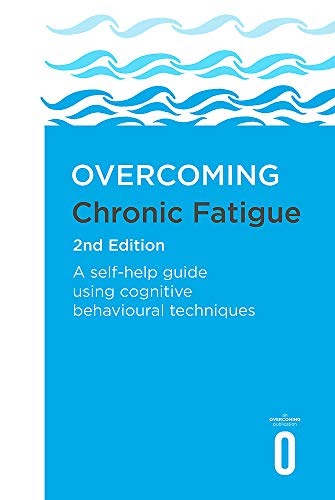Chronic Fatigue Syndrome (CFS), also referred to as Myalgic Encaphalomyelitis (ME), is a complex, chronic neurological condition with no single medical explanation. Chronic fatigue can occur in children, adolescents, and adults. The main symptom of CFS/ME is extreme mental and physical fatigue which is not improved with rest and often worsens after physical activity. While this overwhelming feeling of tiredness is usually the primary symptom, sufferers of CFS/ME often experience additional symptoms, many of which are ‘flu-like in nature. These may include headaches, achy muscles, joint pain, sore throat, nausea, dizziness, memory/concentration problems and sleep problems. Depression and anxiety are also commonly associated with CFS/ME. As a result of these symptoms, individuals with CFS/ME will often lead a severely restricted life.
The cause of CFS/ME has not been identified, although commonly it occurs following an acute infection or after cancer treatment (also called Post-Cancer Fatigue or PCF). Chronic fatigue may also be triggered by events such as physical trauma, toxic exposure or anaesthetic. Genetics appear to be a factor in many cases. In any individual it is likely that a combination of factors are at play in the development of CFS/ME.
Treatment for Chronic Fatigue
There is no one medical treatment or cure for CFS/ME. A combination of treatment types tend to be most effective at reducing the impact of the condition on an individual’s life and improving the ‘functional capacity’ of the person (i.e., how much they are able to work or study, do physical and mental activities, chores, and engage in social activities). The research indicates that the best outcomes probably occur for individuals who receive a combination of Graded Exercise Therapy (GET), Activity Pacing (AP), and Cognitive-Behaviour Therapy (CBT).
Activity Pacing and Planned Rests
Often individuals with CFS/ME engage in a lot of physical activity when they feel slightly more energetic, which may result in exhaustion and a need to rest for extended periods. This is known as a “boom and bust” cycle of activity and rest, and can aggravate CFS/ME symptoms. Similarly, some people are afraid of triggering the fatigue and may engage in much less activity than they should be (referred to as “Activity avoidance”). Using information from the client about how much of each of their usual activities they can manage before they feel overly fatigued, and the amount of rest they typically need over the course of a week, the psychologist will help devise a program to regulate the amount of rest and activity the client should do each day. A baseline level of activity will be established and then gradually increased over time. The consistency in this type of program is important in helping the individual to manage their symptoms.
Strategies to improve sleep
Individuals with CFS/ME commonly experience sleep problems such as irregular sleep, unrefreshing sleep or difficulty falling asleep. This often leads to napping during the day. The psychologist will help clients determine the cause of any sleeping difficulties such as worrying at bed-time or late activity levels. Strategies will be implemented such as ‘sleep hygiene’ and establishing a regular sleep routine and sleep/wake cycle which will help to address any sleeping difficulties.
Graded Exercise Therapy (GET)
A baseline level of exercise will be established (often in conjunction with a Physiotherapist or Exercise Physiologist), and which usually involves three short periods of low-intensity exercise each week. Once this is tolerated well and does not trigger excessive fatigue, the level or intensity of exercise is gradually increased until a reasonable level of exercise each week is tolerated without triggering unreasonable levels of fatigue.
Cognitive Exercise Therapy (CET)
This is also sometimes referred to as Mental Activity Pacing (MAP) and involves building the ability of the client to engage in tasks that are mentally demanding, and using mentally challenging tasks to improve neuro-cognitive functions such as attention, concentration, and memory. These cognitive tasks can include games and puzzles, computerised puzzles, and can also include common tasks such as reading.
Cognitive Behaviour Therapy (CBT)
CFS/ME is undoubtedly a physical illness. However, certain patterns of thinking and behaviour are thought to worsen the impact of the condition on an individual’s life. Psychologists employing CBT aim to work with the client to identify these factors and implement specific strategies to lessen the effects of CFS/ME. Controlled research trials have shown that 70% of patients who receive CBT for Chronic Fatigue show improvements in how they live their life, compared to those in a control group who received only relaxation therapy or the usual medical treatment (20-27%).
Components of CBT treatment for CFS/ME include:
Identifying and addressing unhelpful thinking
Most individuals with CFS/ME hold certain thoughts and beliefs about their illness. Some of these thoughts may be unhelpful, worsening the effect of CFS/ME on the individual’s functioning. The psychologist will work with the client to help identify unhelpful thinking patterns and introduce strategies to manage them differently, thereby reducing their impact. CBT is often used with patients with Chronic Fatigue to address other associated issues such as Depression and Anxiety.
Setting Goals and Targets
One of the first steps to CBT is to explore the individual’s treatment goals. Most individuals with CFS/ME would be able to identify various goals or targets they would like to achieve, usually requiring increased activity levels. The psychologist helps the client to define these targets into manageable steps, requiring only very gradual changes to activity level.
Problem-Solving
Sometimes with CFS/ME comes practical problems or issues which need to be solved. Due to mental and physical fatigue, solving such problems may be difficult for people with this condition. When this is the case, the psychologist will work with the client on structured problem-solving in order to help them find and implement a preferred solution.
If you would like to find out more about our treatment for Chronic Fatigue Syndrome, or to book an appointment with one of our clinical psychologists who provides treatment for this condition, please email or call the clinic on 02 9438 2511.


